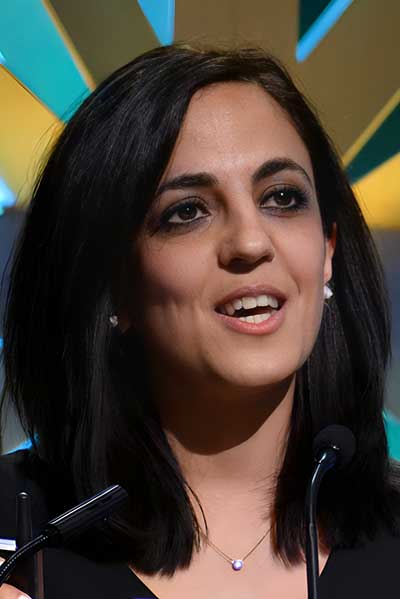Puja Mehta, MD, MBBS, a rheumatologist at University College London, United Kingdom, began the Daltroy Lecture at ACR Convergence 2023 with an unexpected disclosure: She told the audience that she is not an expert.

“I’m more of an explorer,” she said. “I don’t have all the answers, but I do have some lived experience.”
Daltroy: Redefining Imposter Syndrome: Eliminating Bias and Transforming Culture, is available on demand for registered ACR Convergence 2023 participants through Oct. 31, 2024, on the meeting website.
Dr. Mehta began her lecture by asking attendees to lean into what they might find uncomfortable. That’s a good thing, she said, because “emotions signal what you value.”
What is problematic, she continued, is that what we’ve often described as “imposter syndrome” is actually testimonial injustice underpinned by bias.
She gave an example of a meeting where Person X speaks up but is ignored. Person Y appropriates Person X’s idea and is praised. Person X feels unconfident and stops speaking up.
“What has actually happened is Person X has suffered a credibility deficit, and Person Y has been given the credibility excess,” Dr. Mehta said. “And that, taken together, my friends, is testimonial injustice.”
The remedy she offered is not to fix individuals or groups, but to fix bias.
Bias can come from many directions, such as a feeling of belonging (or lack of it) or judgment based on someone’s appearance. That bias has a big impact, particularly in medicine. Racial bias exists in pain assessment and maternal mortality, for example.
“There are race-based assumptions in many medical specialties that are dangerous without evidence,” she said. “We really need race-agnostic algorithms and critical thinking to interpret evidence-based medicine, including data bias.”
People may change to fit in, but that success can come at a cost to authenticity. Conflict over self-image or culture is uncomfortable; no one wants to feel bad about themselves. Overcoming that discomfort can be a challenge.
Creating inclusive cultures that value diversity and representation is essential to providing solutions, Dr. Mehta said, using science as an example. She cited a study that looked at over 1 million papers globally and found that the five-year citation count was most closely related to group mean ethnic diversity of the authorship team.
“Group mean ethnic diversity was more important than age, gender, discipline, and affiliation,” she said. “Perhaps diverse teams may have more innovative creative research questions, or they may be more likely to recruit minority patients in their trials. They may be more resistant to groupthink and have better global reach and visibility.”
She outlined the four “A’s” of inclusion, which create a blueprint for potential solutions from organizations and individuals:
- Acknowledge there’s a problem;
- Raise awareness;
- Have accountability; and
- Take action.
However, while organizations can have good intentions, the impact may not always be positive.
For example, one diversity, equity, and inclusion (DEI) metric is implicit or unconscious bias training, which is now a multimillion-dollar industry. Evidence suggests it increases the awareness of unconscious bias, Dr. Mehta said, but there is no evidence that it leads to behavioral change, and it may actually worsen outcomes.
“Why? Because it’s mandatory, creating resentment and blame,” she said. “That’s why people are not receptive. It may reinforce stereotypes; it can normalize having bias or create complacency.”
She suggested improving unconscious bias training by making it voluntary and creating a variety of ongoing formats that allow time for reflection.
Individually, it is important for people to understand their reason for desiring change. Self-awareness is the key, Dr. Mehta said. Knowing oneself can bolster confidence, but there are costs and risks to speaking up, such as microaggressions.
As medical professionals, the truth matters, she said. Self-awareness and reflection involve asking: Who am I, and who do I want to be?
“Do your actions align with your values?” Dr. Mehta asked. “Check your biases as often as you check your phone.”
Finally, she said, hold on to hope. It can be a superpower in the face of adversity.
“Hope is what drives you to speak up when other people tell you to be silent. It can drive you to do the uncomfortable and inconvenient,” Dr. Mehta concluded. “Find hope in yourself and people around you.”
Register Today for ACR Convergence 2025

If you haven’t registered for ACR Convergence 2025, register today to participate in this year’s premier rheumatology experience, October 24–29 in Chicago. All registered participants receive on-demand access to scientific sessions after the meeting through October 31, 2026.
